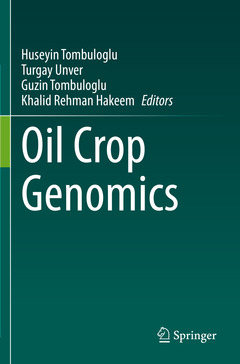Description
Oil Crop Genomics, 1st ed. 2021
Coordinators: Tombuloglu Huseyin, Unver Turgay, Tombuloglu Guzin, Hakeem Khalid Rehman
Language: English
Subjects for Oil Crop Genomics:
Publication date: 09-2022
439 p. · 15.5x23.5 cm · Paperback
Publication date: 09-2021
439 p. · 15.5x23.5 cm · Hardback
Description
/li>Contents
/li>Biography
/li>Comment
/li>
Plants are an important source of fats and oils, which are essential for the human diet. In recent years, genomics of oil biosynthesis in plants have attracted great interest, especially in high oil-bearing plants, such as sesame, olive, sunflower, and palm. Considering that, genome sequencing projects of these plants have been undertaken with the help of advanced genomics tools such as next generation sequencing. Several genome sequencing projects of oil crops are in progress and many others are en route. In addition to genome information, advanced genomics approaches are discussed such as transcriptomics, genomics-assisted breeding, genome-wide association study (GWAS), genotyping by sequencing (GBS), and CRISPR. These have all improved our understanding of the oil biosynthesis mechanism and breeding strategies for oil production.
There is, however, no book that covers the genomes and genomics of oil crops. For this reason, in this volume we collected the most recent knowledge of oil crop genomics for researchers who study oil crop genomes, genomics, biotechnology, pharmacology, and medicine. This book covers all genome-sequenced oil crops as well as the plants producing important oil metabolites. Throughout this book, the latest genomics developments and discoveries are highlighted as well as open problems and future challenges in oil crop genomics. In doing so, we have covered the state-of-the-art of developments and trends of oil crop genomics.
Dr. Huseyin Tombuloglu (PhD) is Associate Professor at Institute of Research and Medical Counsultaion (IRMC) of Imam Abdulrahman bin Faisal University, Dammam, Saudi Arabia. He received his BSc. degree in 2007 from Istanbul University, Department of Molecular Biology and Genetics, Turkey, and also he studied as an exchange student in University of Groningen, the Netherlands. He obtained MS degree (Biology) in 2010 and PhD degree (Biotechnology) in 2014. He bacame Assistant Professor in 2014, and Associate Professor in 2018. He has more than 15 years of teaching and research experience in Genetics, Molecular Biology, Plant Genomics, and Biotechnology, as well as Bioinformatics. He is one of the member of the International Olive Genome Sequencing Consortium. Currently, he is one of the research team member of the International Garlic Genome Sequencing Consortium (IGGS). His current research is focused on genome sequencing of plants, data analysis, proteomics, and nanoparticle-plant interaction.
Prof. Turgay Unver (PhD) Turgay Unver achieved his PhD degree from the Middle East Technical University (METU; Turkey) in 2008. He became Assistant Professor at Cankiri Karatekin University in 2009, and obtained his Associated Professorship in 2011. His main research areas involve genome and transcriptome analyses, including microRNA. He has published >50 indexed articles with more than 4000 citations. In 2012, he was awarded the TWAS prize. He was selected as outstanding young scientist by the Turkish Academy of Science in 2013. He is currently running two Biotechnology companies and bearing editorial duties for Genomics (Elsevier), BMC Genomics, and Plos One.
Dr. Guzin Tombuloglu (PhD) received her MS degree (Biology) in 2008 and PhD degree (Biotechnology) in 2014. She has experience in transcriptome sequencing, plant abiotic stress tolerance, molecular biology of plants. During her PhD, she studied transcriThese books may interest you

The Sesame Genome 210.99 €



